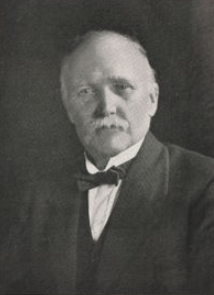James Brown (Scottish politician) facts for kids
Quick facts for kids
The Right Honourable
James Brown
|
|
|---|---|

James Brown c. 1931
|
|
| Born | 16 December 1862 Whitletts, Ayrshire, Scotland
|
| Died | 21 March 1939 (aged 76) Ayr, Ayrshire, Scotland
|
| Title | Member of Parliament for South Ayrshire |
| Term | 1918-1931, 1935-1939 |
| Predecessor | Sir William Phipson Beale James Orr MacAndrew |
| Successor | James Orr MacAndrew Alexander Sloan |
| Political party | Labour Party |
| Spouse(s) | Catherine MacGregor Steel (m. 1888) |
| Children | 5 |
| Parents |
|
| Relatives |
|
James Brown, who received the OBE and was a DL, was an important Scottish politician. He was born on December 16, 1862, and passed away on March 21, 1939. He was a member of the Labour Party.
James Brown's Early Life and Career
James Brown was born in Whitletts, a part of Ayr, Scotland. His parents were James Brown and Christina O'Hara. In 1888, he married Catherine McGregor Steel. They had five children together. Sadly, two of their children, Christina and James, died young. Their son David also passed away during World War I.
James spent most of his life in Annbank, where he also went to school. He started working in coal mines when he was just 12 years old. This early experience shaped his future. He later became a leader for miners, serving as Secretary of the Ayrshire Miners' Union. He also worked for the Scottish Miners' National Union.
A Life in Politics
James Brown tried to become a Member of Parliament (MP) for North Ayrshire in 1910, but he didn't win. However, he later became the MP for South Ayrshire. He held this position from 1918 to 1931, and again from 1935 until his death in 1939.
In 1917, he was given the OBE. This award recognizes people who have made a great impact. In 1930, he became a Privy Counsellor. This is a group of important advisors to the King or Queen.
James Brown was also chosen to be the Lord High Commissioner to the General Assembly of the Church of Scotland three times: in 1924, 1930, and 1931. Even though this role came with a large salary, he and his wife chose to stay in their small cottage. People in his hometown sometimes called him the "Uncrowned King of Annbank." He also taught at the local sunday school in Annbank.
Views and Legacy
James Brown was part of a committee that created the Scottish National War Memorial at Edinburgh Castle. This memorial honors those who served in World War I. He also spoke out about a painting in the Palace of Westminster. He felt the painting, which showed the union of England and Scotland, was not historically accurate. He believed it made Scotland look bad.
The famous football manager Bill Shankly once said that James Brown won elections because people in South Ayrshire wouldn't vote for the Conservative Party. However, Shankly also noted that some Labour members thought Brown was "too mild" and not a "keen socialist."
In 1930, James Brown was given the "Freedom of the City" in Ayr. He also received this honor in Girvan in 1931. The University of Glasgow gave him an honorary law degree in 1931. He was also a Deputy Lieutenant for Ayrshire.
A book about his life, called "From Pit To Palace," was published in 1931. James Brown was the great-uncle of David Steel, who later became the first leader of the Scottish Parliament.
James Brown passed away in Ayr on March 21, 1939, at 76 years old. His children were with him. His last words were reportedly "Look after Katie," referring to his wife, who was unwell. She died a few years later in 1942.

